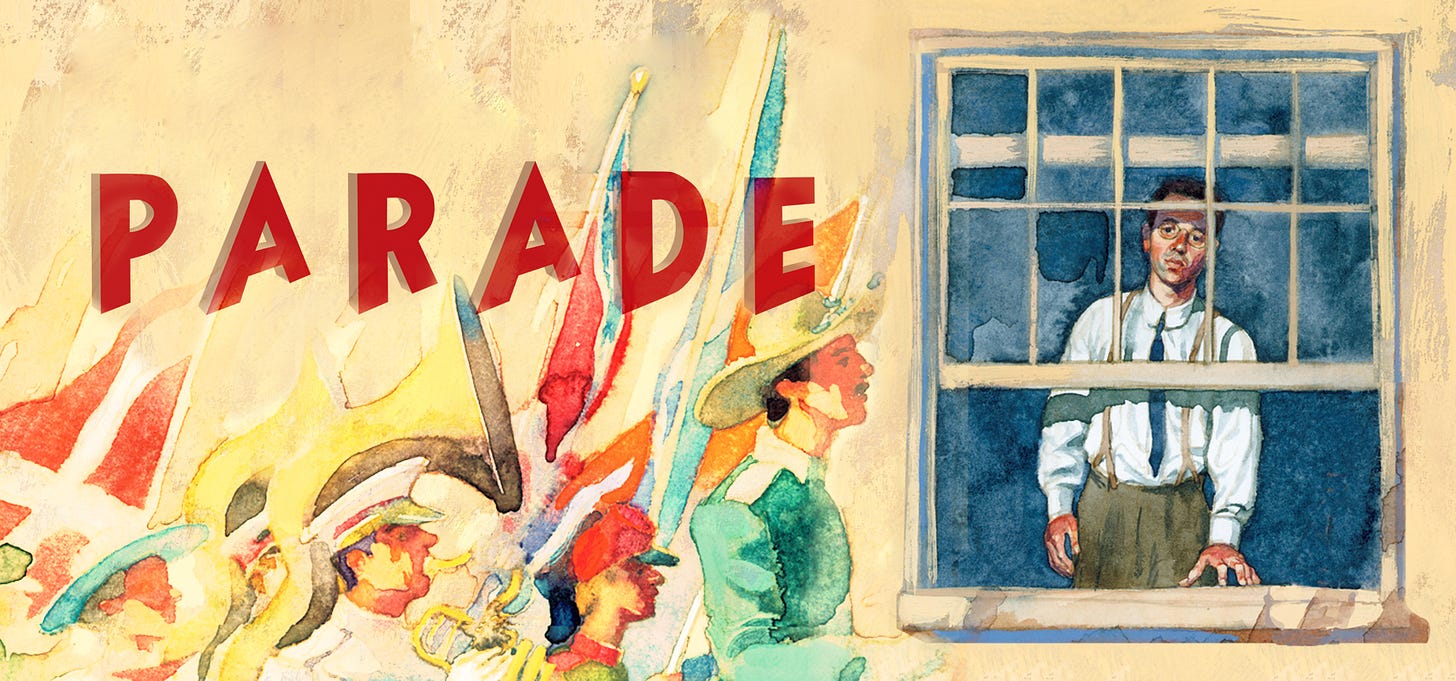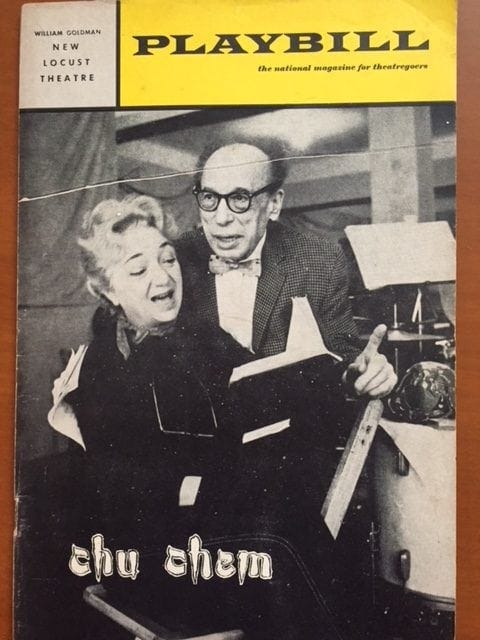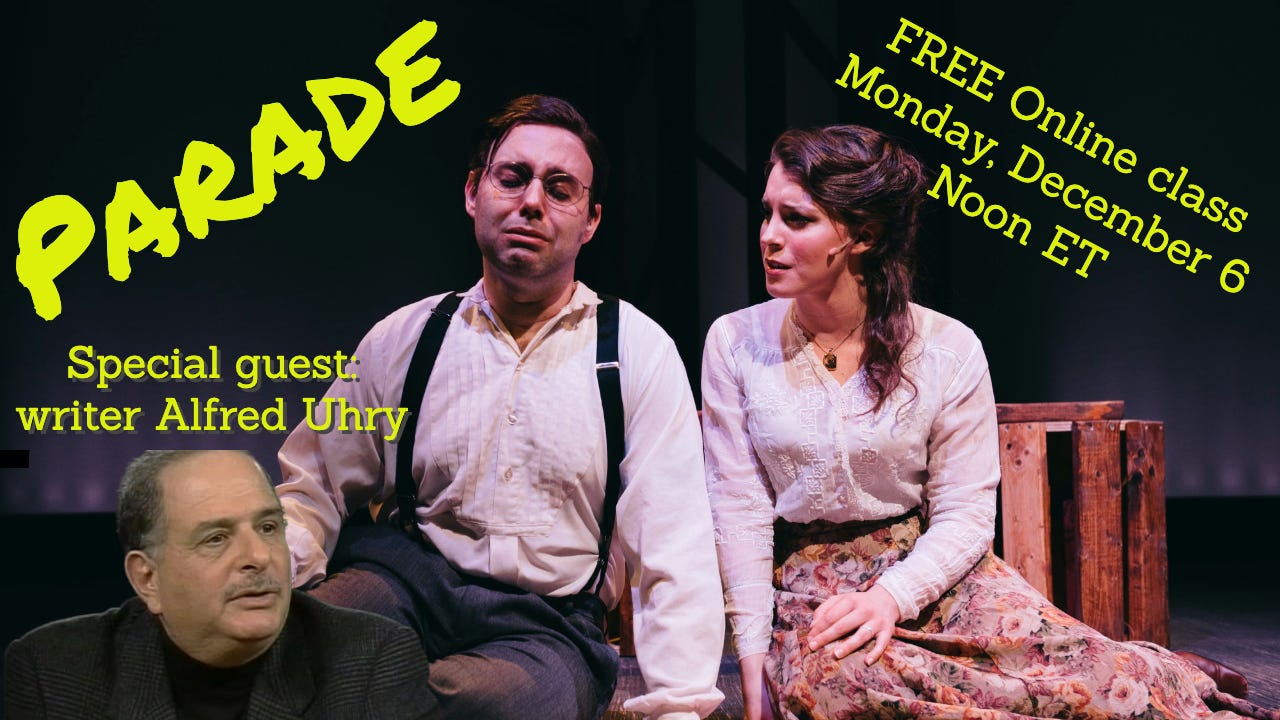The worst Jewish musical ever? "Chu Chem" was no "Fiddler"
The Broadway Maven, David Benkof, interprets Broadway
Here’s your FREE monthly issue of the Weekly Blast. If you like it, why not subscribe? It’s only $5 a month or $36 a year.
Shalom!
This week, The Broadway Maven looks at Parade:
• On Monday, December 6 at Noon ET, there will be a FREE Zoom class exploring that important show about Southern anti-Semitism. Register here.
• This Weekly Blast unearths Chu Chem, a monstrously bad Jewish musical; RANTS about Broadway ticketing policy; contains a student RAVE about Bye Bye Birdie; and links to two YouTube GEMs: one with Jason Robert Brown at the piano discussing the opening number of Parade; and a high school Pharaoh/Elvis whose performance is through the roof.
This week, as The Broadway Maven considers a great Jewish musical (Parade) it might be fun to look at Chu Chem, the worst Jewish show ever to hit Broadway. The musical initially showed promise, since the music was by Mitch Leigh — just one year after his triumph in Man of La Mancha. Calling itself a “Zen Buddhist-Hebrew musical comedy,” the intricate play-within-a-play plot of Chu Chem involves a search for the Chinese Jews of Kaifeng (a real group). The musical starred veteran Yiddish theater performers, including Molly Picon (later to play Yente on screen in Fiddler) until she quit the show in disgust. The title is a play on the Hebrew word “chacham” (wise man). Clever, right?
Here’s how bad it was:
• One reviewer said the show was “like blintzes and soy sauce” and that “a better title would have been The King and Oy.”
• Chu Chem received no Tony nominations in a historically terrible season – some of the other flops include Carrie and Legs Diamond .
• Theatergoers were handed fortune cookies with messages like “a half-hour after seeing Chu Chem, you’ll be hungry to see it again.”
• The opening number is called “Orient Yourself” - and the second act opens with “Re-orient Yourself”
• At one point an actress turned to the audience and declared, “There was a song here, but you’ll be better off without it.”
• One character (played by a white actor in Asian makeup) was named Mongol Lord Hoo Ha.
• During the entire intermission, sumo wrestlers competed on stage. Sumo is a Japanese sport, not a Chinese one.
• The show closed after a handful of performances in Philadelphia in 1966, and its Broadway run was hardly more impressive (44 showings). The maven of Broadway disasters, author Ken Mandelbaum (Not Since Carrie), calls Chu Chem one of the few examples of the “double flop” genre.
On a recent theater trip to New York, I noticed that some of the shows had ticket policies that tickets on cell phones would not be accepted, and others required that only tickets on phones would be permitted for entry. Come on, make up your minds, theater people. Technology is pretty fancy in 2021. Set it up that you can admit all theatergoers, whether they have only paper tickets or only cyber tickets.
Grey Bayliss: My grandfather was one of the original choreographers on Bye Bye Birdie, so I have probably seen productions of that show more times than I could count. The Bye Bye Birdie film is an utterly charming slice of mid-century nostalgia, and will always spark nostalgic memories of going to see the show with my grandfather. Bye Bye Birdie boasts a bright, cheerful score full of catchy tunes that mix conventional musical-theatre-style songs with the new rock ‘n’ roll style. The rock ‘n’ roll beats of the ‘60s seem tame by today’s standards, but the themes of this musical (the generational gap between teenagers and their parents; fears over the seeming hysteria a rock idol is causing; the carefully crafted but exaggerated image of a media sensation), are as relevant as ever.
The entire cast does fine work. The titular Conrad Birdie hits just the right tone, treading the fine line between playing up both the sex appeal and lack of self-awareness of the clueless rock star in rollicking numbers like “Honestly Sincere,” “One Last Kiss” and “A Lot of Livin’ to Do.” Playing the comedy to a hilt is Paul Lynde as Kim’s harried father, who later went on to TV fame.
In contrast to its current life as a staple of high-school and college productions looking for something inoffensive for young kids to play, Bye Bye Birdie was originally a daring, revolutionary experiment, featuring a contemporary story incorporating brand-new popular musical forms. Consequently, what’s captured on this recording still feels like a lively breath of fresh air nearly 60 years after it was made, that will absolutely bring a smile to your face.
Here, Parade composer Jason Robert Brown explains the story behind writing the song that bookends the show, “The Old Red Hills of Home.”
One of the most random, out-of-the-blue moments in musical theater is in Joseph and the Amazing Technicolor Dreamcoat, when the eponymous Hebrew slave appears before Pharaoh to interpret his dreams. Pharaoh turns around… and it’s Elvis.
It’s a great opportunity for camp and excess in any production, but I’ve never seen a better Pharaoh than this one, from Cherry Creek High School in Colorado. His mastery of the room and intimacy with the audience is impressive, and interpretation of The King, dialed up to full heartthrob, is dead-on. Enjoy!
The 1998 Broadway show Parade explores an infamous episode in Southern Jewish history - the lynching of Leo Frank. We’ll have the privilege of being joined by Alfred Uhry (Driving Miss Daisy), who wrote the book (script) for the musical.
Register: bitly.com/MavenParade
If you haven’t seen Parade, you can familiarize yourself with the music and the plot in this “Ten-Minute Broadway” featurette. React in the comments section.
Note: links to register for ALL classes are ALWAYS available at TheBroadwayMaven.com.
Monday, December 6: Parade with book writer Alfred Uhry (FREE, Noon ET ONLY)
Monday, December 13: Chicago (FREE, Noon and 8 pm ET)
Monday, December 20: Wicked with book writer Winnie Holzman (FREE, 8 pm ET ONLY)
Monday, December 27: Barbra Streisand’s musicals (FREE, Noon and 8 pm ET, registration opens soon)













